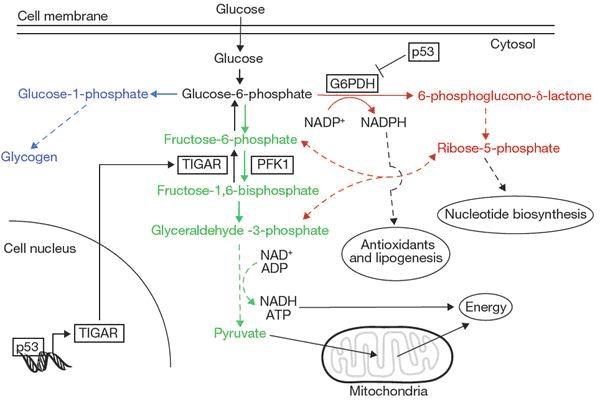Researchers from the University of Science and Technology of China and the University of Pennsylvania (USA) have discovered a novel role of p53 in regulating glucose metabolism.
The prestigious international journal Nature Cell Biology online published a research paper "p53 regulates biosynthesis through direct inactivation of glucose-6-phosphate dehydrogenase" by Dr. Mian Wu and Dr. Xiaolu Yang (professor of Department of Cancer Biology, University of Pennsylvania, School of Medicine, USA), on Feb 20, 2011.
This paper was highlighted in Nature Cell Biology's News and Views section "p53 guards the metabolic pathway less travelled" by Dr. Eyal Gottlieb (Cancer Research UK, the Beatson Institute for Cancer Research, Glasgow, G61 1BD, UK).
The paper described a novel role of p53 in regulating pentose phosphate pathway. TP53 is the most frequently mutated tumour suppressor gene, and whose mutation accounts for more than 50% of the human malignant tumors. Besides its well-defined functions in regulating cell cycle control, DNA damage repair and apoptosis, p53 has been recently found to regulate cell metabolism, especially the glucose metabolism. Dr. Wu and Dr. Yang' s labs had discovered that p53 plays a crucial role in regulating an alternative glucose metabolic pathway, namely pentose phosphate pathway (PPP). p53 was found to directly interact with Glucose-6-phosphate dehydrogenase (G6PD), a key enzyme of PPP and inhibit its activity. In doing so, normal cells preferentially utilize glucose for glycosis/TCA cycle for the purpose of energy production. When p53 is mutated as has been seen frequently in human cancer cells, altered p53 is unable to interact with and thereby inhibit G6PD, and the flux rate of the ox-PPP (oxidative PPP) is increased, leading into increased NADPH and ribose levels that support lipid biosynthesis and rapid proliferation of tumor cells. This finding partly explains the long-lasting puzzle proposed by the Nobel laureate Otto Warburg in 1920 s: in normal cells, p53 inhibits PPP, and therefore the majority of glucose is utilized by glycoltic pathway for energy production; in p53-decifient or p53 mutated tumor cells, however, glucose will be greatly consumed via PPP not for the energy production, but for the purpose of biosynthesis in order to meet the requirement of unlimited growth of tumor cells,. Moreover, Drs Wu and Yang' s finding firstly proposed that in addition to p53 transcription activity, it possesses catalytic activity.
The co-first authors are Dr. Jiang Peng and Dr. Du WenJing. Both of them were graduated from Dr. Wu Mian' s lab and they are now working as postdoctorial fellows in Dr. Yang XiaoLu' s lab.
This work was supported by the grants from the National Natural Science Foundation of China, the Chinese Academy of Sciences and the Ministry of Science and Technology.

Adapted from Nature Cell Biology /News and Views (Feb 20 AOP)
Peng Jiang, Wenjing Du, Xingwu Wang, Anthony Mancuso, Xiang Gao, Mian Wu* & Xiaolu Yang* p53 regulates biosynthesis through direct inactivation of glucose-6-phosphate dehydrogenase Nature Cell Biology Published online: 20 February 2011 doi:10.1038/ncb2172
School of Life Science of USTC, News Center of USTC
Related News
Photos
More>>history
- Vice-Rectors of The Universitat Polit cnica de Catalunya (UPC), Spain, visited
- Governor of Uppsala visited ZJU
- Delegation from Faculty of Engineering, Lund University Visited ZJU
- The International Office Holds New Year Reception for International Students
- Chinese-German Exchange Activity was held in Hohai University





